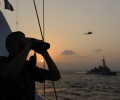Merchant Shipping Reassurance through Deterrence

Confidence in the rules-based international system is essential to the stability of the global economy. Without it commerce could not flow as freely as necessary to keep up with the world’s demand. For this reason eight partner nations work together within the International Maritime Security Construct (IMSC) to cultivate that confidence in the Middle East region. Partner nations include Albania, Bahrain, Estonia, Lithuania, Saudi Arabia, United Arab Emirates, United Kingdom, and the United States.
Coalition Task Force (CTF) Sentinel, as the operational arm of the International Maritime Security Construct (IMSC), was created to deter state-sponsored malign activity throughout the Middle East region’s international waters. Deterrence reassures the merchant shipping industry that the sea lines of communication will remain open for business.
One important element of the task force’s deterrence effort is its use of Maritime Awareness Calls (MACs). These radio calls are conducted from IMSC coalition warships or aircraft, which by their very presence, discourage activity aimed to threaten freedom of navigation.
“Primarily, the maritime awareness call provides audible assurance over very high frequency (VHF) radio to transiting merchant vessels that active patrols are operating to assist in challenging against malign or threatening behavior. These calls encourage merchant traffic to continue their passage in line with international laws and support freedom of navigation,” explained Royal Navy Lt Cdr Dudley Malster, the task force’s Staff Operations Officer.
“Secondly, MACs allow other actors to hear the same message. This open and clear statement of intention means that, should interference in the form of threatening or malign action be directed against IMSC-flagged ships, we are prepared to close in and support them.”
When conducting MACs, IMSC warships or aircraft regularly transmit the following message using a VHF radio on channel 16, the common channel for all vessels within range to monitor:
“Securite, Securite, Securite. All stations. This is coalition warship/aircraft conducting maritime security operations in support of the International Maritime Security Construct. The IMSC promotes freedom of navigation and the free flow of commerce. If you observe any suspicious or illegal activity, or require advice, contact UKMTO (United Kingdom Maritime Trade Operations) as soon as possible. If you require emergency assistance contact the nearest IMSC coalition warship on Channel 16. Out.”
After the attention-grabbing introduction, the first line broadcasts the presence of a military asset supporting the IMSC mission. State actors undermining international maritime norms likely aim to do so without being directly tied to any incriminating evidence, protecting deniability if necessary. Any danger of exposure is problematic to their efforts because exposure of such undermining activity damages their legitimacy.
“Many nations are understandably vying for influence in this very important region,” said U.S. Navy Lt. Phu Doan, CTF Sentinel’s Intelligence Officer.
“Therefore, a state’s international reputation within the global community can be undermined by its unacceptable maritime behavior, especially when exposed.”
Next, by stating IMSC’s purpose of promoting freedom of navigation and the free flow of commerce, the MAC illustrates adherence to the rules-based international order and demonstrates that IMSC is acting in the interest of all seafarers legally utilising the global commons.
In furtherance of that interest, IMSC assets remind merchant vessels of the role played by UK Maritime Trade Operations. UKMTO is trusted by the maritime community for updates on regional maritime security. These updates include up-to-date sharing of information regarding suspicious activity in the form of warnings and advisories to ensure that shipping is equipped with the awareness necessary to carry out their assignments safely.
“UKMTO provides a trusted information service to the maritime industry and enables IMSC, and other maritime security-focused organizations, to maintain effective communication with commercial ships at sea,” said U.S. Navy Lt. Cmdr. Danielle Centeno, the task force’s Maritime Trade Officer.
“This is why it is crucial that commercial ships contact the UKMTO first in the event that they observe any suspicious or illegal activity.”
The final line of the MAC message encourages shipping to contact IMSC warships who can provide proximate assistance in the event of an emergency. For example, on August 5th, 2020 UK-flagged Motor Vessel STENA BLUE SKY called USS Ralph Johnson, which was on assignment supporting the IMSC mission, because it was being harassed on the radio. When USS Ralph Johnson announced it was in route, the harassment quickly ended.
Aside from the MACs, the strategic presence of warships themselves serves as an effective deterrent of state-sponsored malign activity. Larger partner nation vessels like frigates, destroyers, cruisers, and amphibious transport dock or assault ships support the IMSC as Sentinels. They possess advanced communication systems and in some cases helicopters, which are supporting elements that serve as important contributors to the efforts of exposing malign activity.
“With their advanced communications suites, Sentinels aid in our essential information sharing effort among partner nations and the shipping community,” said U.S. Navy Capt. Christopher Milner, CTF Sentinel’s Chief of Staff for operations.
Partner nations employ smaller naval vessels, termed Sentries, to provide a continuity and persistence of maritime presence in the task force’s area of responsibility. These Sentries often include patrol craft and corvettes.
“Sentries amplify our presence effort, geographically extending our reach and supporting the stability of the maritime environment,” explained Milner.
Sentinels and Sentries provide overwatch for approximately 200 merchant vessel transits a month through the Strait of Hormuz and the Bab el-Mandeb Strait, which translates to more than 18,000,000 tons of merchant shipping combined carrying capacity traveling within the region monthly.
“The global economy relies on the free and open flow of commerce on the sea lines of communication here in the Middle East,” said Royal Navy Commodore Adrian Fryer, CTF Sentinel’s Commander.
“Therefore, the merchant shipping community must know that they have our complete support, because accomplishing our mission depends on mariners accomplishing their mission to transport the world’s goods in a timely manner.”
Manned and unmanned aircraft supporting the IMSC mission provide more than 2,000 hours of overwatch monthly and Sentinels and Sentries make a combined total average of more than 1,000 MACs monthly.
Beyond the MACs and the deterrent presence of partner nation assets supporting the mission, CTF Sentinel headquarters staff members work daily to cultivate relationships with regional naval and shipping industry leadership to ensure the efficient exchange of important maritime security information.
To date, no IMSC-flagged merchant vessel has been attacked since the creation of the coalition.
Coalition Task Force Sentinel, the operational arm of the International Maritime Security Construct, is a multinational maritime effort to promote freedom of navigation and reassure merchant shipping by deterring and exposing state-sponsored malign activity that threatens security of the maritime commons in the Arabian Gulf, Strait of Hormuz, Gulf of Oman, Gulf of Aden, Bab el-Mandeb Strait and Southern Red Sea.
Source: Coalition Task Force Sentinel

 Hellenic Shipping News Worldwide Hellenic Shipping News Worldwide, Online Daily Newspaper on Hellenic and International Shipping
Hellenic Shipping News Worldwide Hellenic Shipping News Worldwide, Online Daily Newspaper on Hellenic and International Shipping





















 PG-Software
PG-Software